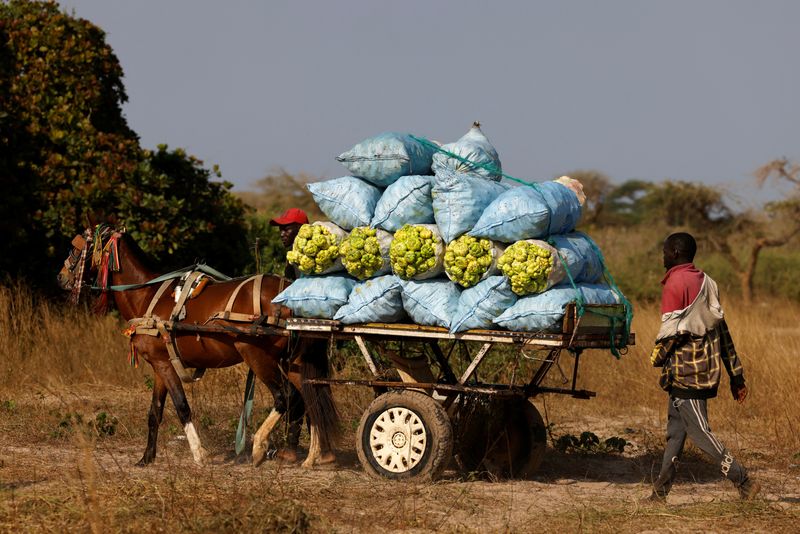5/5

© Reuters. FILE PHOTO: Freshly harvested eggplant bags are loaded on a cart at a field of farmer Mor Kabe, on the outskirts of Notto Gouye Diama village, Thies region, Senegal January 24, 2023. REUTERS/Zohra Bensemra
2/5
By Ngouda Dione and Bate Felix
NOTTO GOUYE DIAMA, Senegal (Reuters) – As African heads of state gathered in Senegal’s capital Dakar for a three-day summit this week to find solutions to food insecurity on the continent, 33-year-old farmer Mor Kabe had a message for them.
“Make sure support reaches smallholder farmers.”
Smallholder farmers like Kabe are responsible for an estimated 80% of food production in sub-Saharan Africa. Around 33 million people on the continent are smallholders, according to the International Fund for Agricultural Development.
Kabe said despite the vital role they play, they still struggle to get finance and fertilizer to grow crops.
The outbreak of the conflict between Ukraine and Russia, two major producers, disrupted fertilizer supply to the continent, and stop-gap measures have not been enough to curb high prices which smallholder farmers can’t afford.
“Access to finance is not at all easy,” Kabe told Reuters as he and seven of his neighbours made their way to a two-hectare green patch to harvest egg plants as a cold dawn mist veiled their village some 50 kms (31 miles) north of Dakar.
Banks only lend to those they trust the most, he said, adding: “Sometimes the repayment time is not convenient for us. And you can wait a long time before your loan application is considered.”
He urged leaders at the Dakar meeting to build infrastructure including roads and storage facilities to enable farmers easier access to markets and to preserve their produce.
“We are always obliged to sell so they don’t perish. If we had storage, we could keep our products when the market is saturated,” he said as 15 bags, weighing around 60 kgs (132.3 lb) each filled with eggplants, were loaded onto a horse-drawn cart and taken to the market.
Kabe is one of hundreds of smallholder farmers – the majority of whom are women and youths – in Senegal’s Niayes region which produces the bulk of the country’s fruit and vegetables.
But the region lying behind sand dunes stretching along the Atlantic coast from Dakar to the city of Saint Louis around 200 kms north, is under pressure as the cities expand.
Kabe has been farming on family land since leaving school at 15 but many smallholders near Dakar have lost their farms to urban development as the city expands beyond the peninsula.
Senegalese President Macky Sall told the summit the sensitive issue of land reform was among the priorities for states, so as to guarantee access to land for smallholders.
He added that support to smallholders, improving access to markets, building storage and processing units, were among key measures countries aim to put in place to boost food production and reduce the continent’s reliance on imports.
Source: Investing.com


























